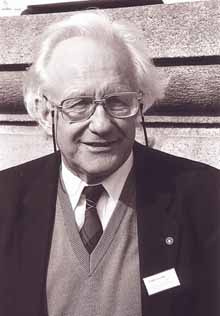Transcend aims "to bring about a more peaceful world by using action, education/training, dissemination and research to handle conflicts creatively and nonviolently." It works, as a non-governmental, largely 'virtual' (internet based) organization, on programs from 'peace journalism' to 'peace at the personal level.' Most significantly, Transcend looks to apply its methodological theory of conflict transformation to ongoing international conflicts where current approaches are failing to bring these conflicts to a nonviolent end. Johan Galtung, director of Transcend and co-founder of the organization in 1993, is also a professor of peace studies and considered a key founding figure in the academic discipline of peace and conflict studies. Galtung articulates an important and optimistic vision of peaceful solutions to conflicts in the Middle East, where peace often seems a frustrating and impossible ideal.
Transcend in Action
Transcend's "conflict transformation" approach relies on nonviolence, creativity, and empathy to facilitate an outcome where both parties move beyond their stated positions to create a new reality in their relationship. This represents a clear contrast to competitive diplomacy and war, the coercive approaches to conflict traditionally used on the international level, which often serve only to perpetuate bitterness and asymmetry.
Galtung's successful role in a 1990s conflict between Peru and Ecuador illustrates the potential of the Transcend method. Asked to mediate between Ecuador and Peru in a longstanding conflict over a piece of territory in the Andes, Galtung proposed the transformation of the disputed territory into a binational zone and the creation of a park in the area with a peace monument. His proposals were implemented and the violence that had characterized this conflict for over 30 years promptly ceased. Galtung remarks, "They've been quarrelling over what trees to plant but very few countries go to war over that problem!" He makes the conclusion that "creativity was the missing dimension." The proposal was also a success because the plan for joint management of the disputed territory led to equitable cooperation between the neighbors. The Ecuador/Peru transformation represents Transcend's general theory in practice.
Iraq
Galtung applies these principled methods of conflict transformation in his suggested approach to the ongoing conflict in Iraq. His vision provides a model by which the world might arrive at a much longed-for peaceful solution. Galtung believes first and foremost that US troops should be withdrawn from the region. But in the attempt to move towards sustainable peace for Iraq this is only a very initial step. Applying the Transcend philosophy, Galtung outlines 4 further practical proposals. He argues, firstly, that an international conference is needed. Importantly, this conference would not be UN-sponsored because of the veto power that currently exists for the UN's 5 permanent members and which prevents any real potential for consensus. Secondly, there needs to be a security arrangement. "This cannot be done by the UN Security Council alone," he points out, "for a reason that has not entered US debate and which most Americans don't know about: the veto powers are four Christian [US, UK, France, and Russia] and one Confucian [China] power. We live in a world with 1.3 billion Muslims. To believe that the UN Security Council has legitimacy in that part of the world is naïve."
Galtung argues that a security arrangement must thus come about from cooperation between the UN Security Council and Muslim countries represented by the Organization of the Islamic Conference. Third, Galtung's suggests Iraq's political arrangement be in the form of confederation, rather than the federation the US government currently proposes. As part of the political arrangement Galtung also proposes the creation of Kurdistan, which includes autonomy for the Kurds in Turkey, Iran and Syria as well as Iraq. He makes the innovative suggestion that citizens of Kurdistan would then have dual regional passports - e.g. Iran/Kurdistan, Syria/Kurdistan etc - and thus no borders would have to be changed. Galtung looks finally to the economic aspect of the current conflict, dominated by issues of oil. He suggests a quota system whereby Sunnis would be given a share of the wealth generated by Iraq's oil, which is sourced in the Kurdish and Shiite parts of Iraq. What is important overall about this thinking is the very existence of such ideas. The US peace movement calls for the withdrawal of troops but beyond that there is little in the way of practical proposals for solutions to the Iraqi conflict. Successful conflict transformation and the achievement of sustainable peace require constructive, creative and realistic proposals.
Israel/Palestine
Galtung's vision for the peaceful transformation of the Israel/Palestine conflict sticks to what he terms Transcend's 'formula of creativity' and the important recognition of the 'need to enter a new element, a new dimension and way of thinking.' Based on the model of the European Community as it was created in 1958, Galtung suggests a 6-state solution. He proposes the creation of a Middle East Community including Lebanon, Syria, Palestine, Jordan, and Egypt along with Israel. These states would thus be brought into joint cooperation and dialogue. Galtung has stressed equal rights as a key to peace within this conflict, and proposes the creation of a Palestinian capital in East Jerusalem. Furthermore this stems, Galtung points out, from a fundamental principle in peace practice and theory: 'if you want something in relation to the other parties be willing to give that to the others too.'
The impetus for such transformation must, he asserts, come from civil society: autonomous movements and organizations created by the Israeli/Palestinian people themselves. Transcend is currently working with organizations of Israeli and Palestinian youth - the future leaders, Galtung suggests, of his envisaged confederation. The Israel/Palestine conflict is one for which Transcend's vision is particularly resonant. Galtung comments: "When I presented this model in Tel Aviv, three well known elderly Israelis came up to me with tears in their eyes and embraced me and said for the first time they had heard something which was both idealistic and realistic. That is the basic point of Transcend; you try to combine the ideal with the real. There are about 20 years to go to realize this - they will be 20 tough years."
Conclusion
Transcend believes that all conflicts are born equal and have the same right to transformation; no conflict is "higher level" than another. Whether the solution lies in a shared national park or the creation of a community of six states, this philosophy ensures that each conflict is addressed by Transcend in the same, principled, peaceful and creative way. Galtung's visions for the peaceful solution of these current violent Middle Eastern conflicts represent peaceful, realistic and therefore compelling alternatives.


